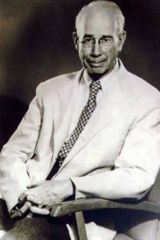
C. I. Lewis
Recent News
- No news.
This is the home page of G. J. Mattey’s Philosophy 134, Modal Logic.
The Course
Philosophy 134 covers modal logic at a basic level. Students will learn the symbolism of modal logic. A number of systems of modal logic, both sentential and predicate, are developed with both natural deduction and axiomatic techniques, and they are interpreted as semantical systems.
General Catalog Course Description
Lecture/discussion—4 hours. Prerequisite: course 112 or Mathematics 108 or the equivalent. Survey of the main systems of modal logic, including Lewis systems S4 and S5. Possible worlds
semantics and formal proofs. Applications to epistemology, ethics, or temporality.
The Topic
Topic: The course will develop some basic approaches to logics for modalities. It begins by surveying a wide range of systems of modal sentential (or propositional) logic. To the underlying truth-functional sentential logic we will add various modal operators, including operators intended to express necessity and possibility. The semantics for formulas containing these operators is developed in terms of “possible worlds.” The possible worlds semantics will be shown to allow for the formulation of a number of different systems of modal logic. These include systems K, D, T, S4, B, and S5, among others. For each system, we will apply natural deduction techniques to show how sentences can be derived from premises or from no premises. The resulting modal systems will be motivated by the way they capture inferences involving a range of types of modality, including necessary truth, knowledge, belief, obligation and temporality. The course concludes with the addition of modal operators to predicate logic.
